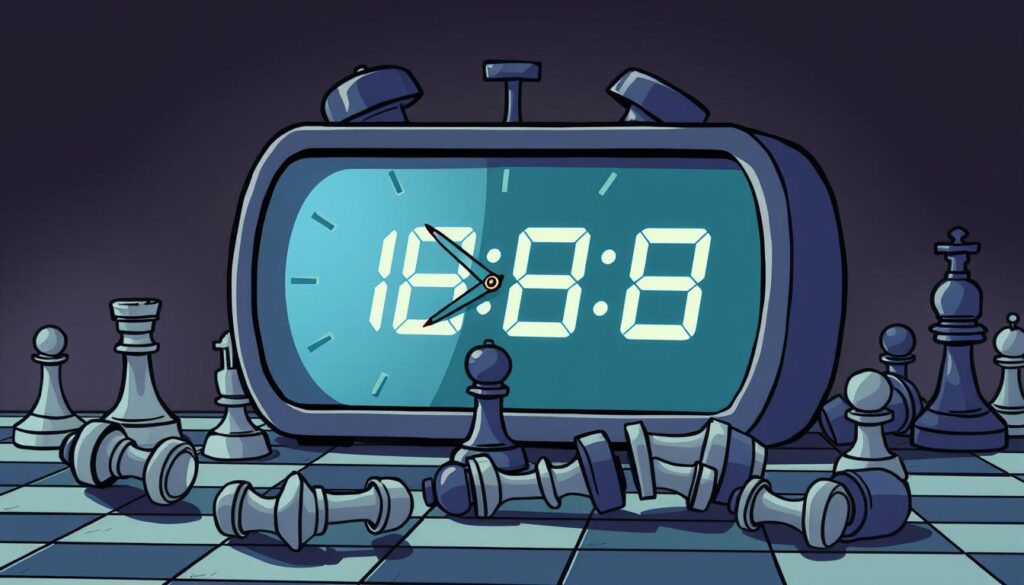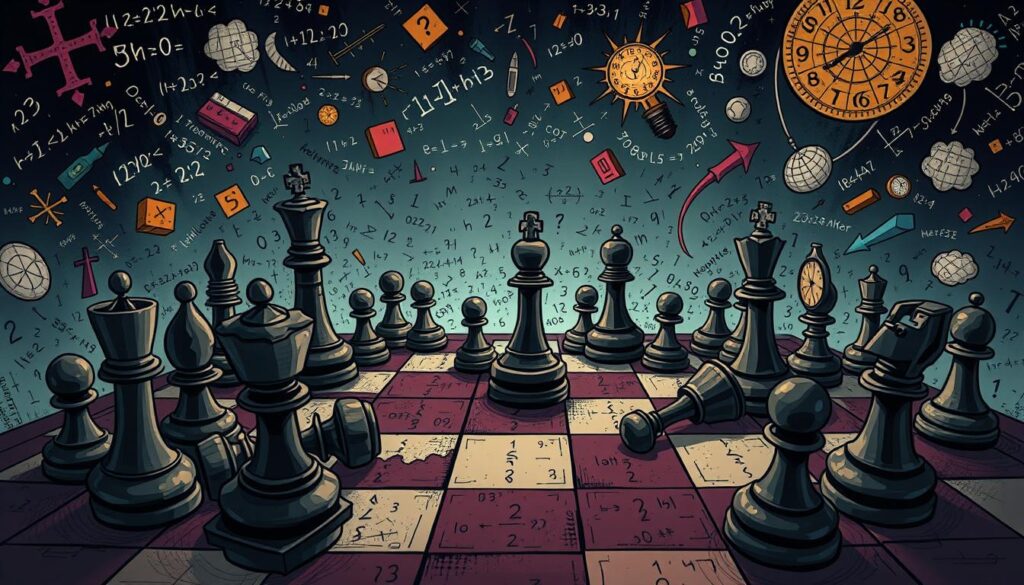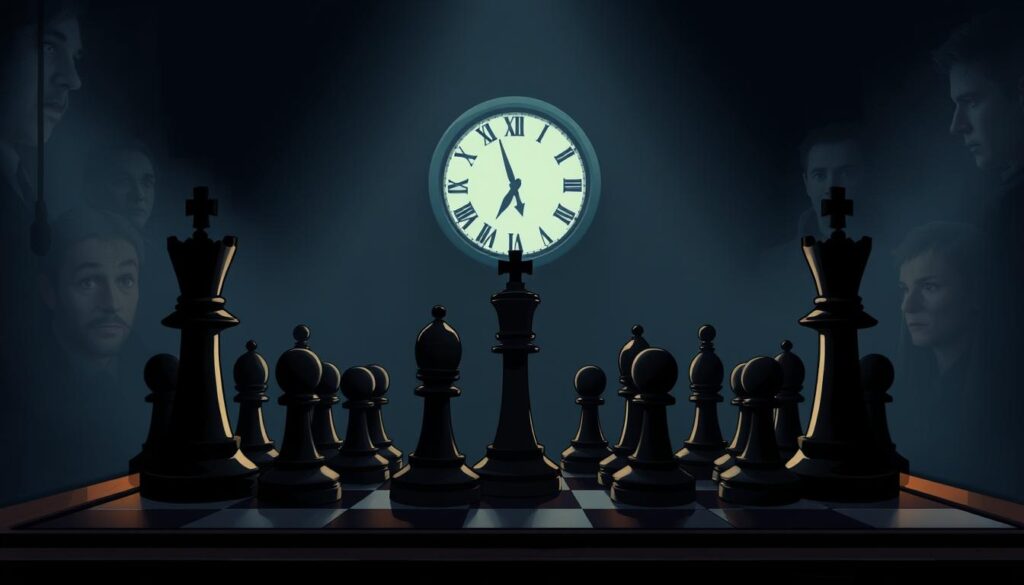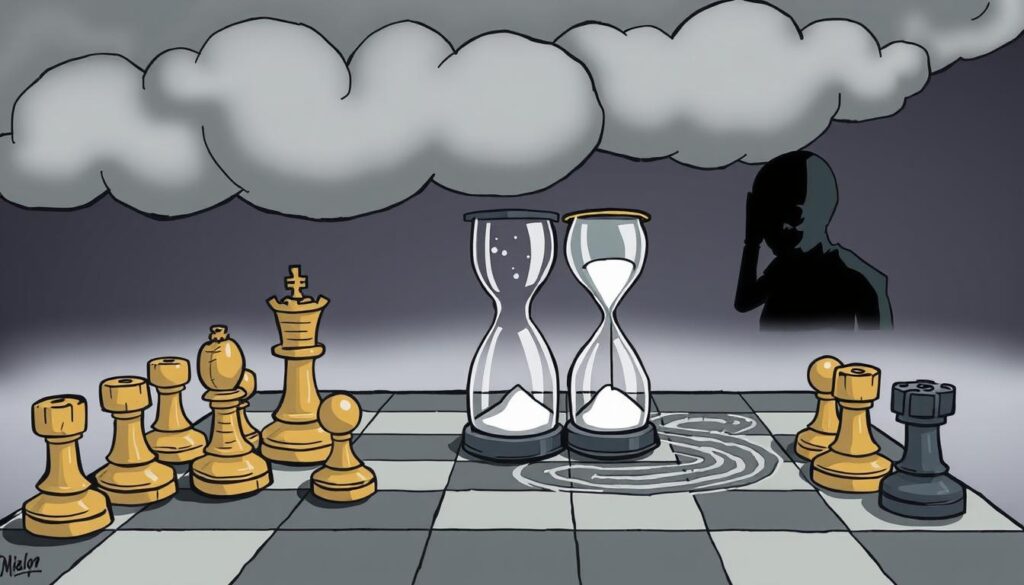Ever wondered why some folks don’t enjoy chess, even though it’s popular and has many benefits? There are several reasons, like the game’s complexity, the time it takes to play, and its competitive nature. This article will explore why some people don’t like chess, shedding light on its appeal and the reasons behind the dislike.
Thinking about why people dislike chess reveals it’s more complex than you might think. Chess has been a favorite game for centuries, enjoyed by millions globally. Yet, it’s not everyone’s cup of tea. We’ll dive into the reasons, including the game’s complexity, the time it demands, and its competitive edge.
Table of Contents
The Time Investment Challenge
Thinking about playing chess? You might find the time needed a big challenge. Many people don’t like chess because it takes a lot of time to practice and study. Hours are spent on analyzing moves, practicing strategies, and improving skills.
Mastering chess is a long-term commitment. It can be tough for those with busy lives. Chess players need to spend several hours practicing, studying, and analyzing games. This can be overwhelming for those who prefer more casual games.
Professional chess players like Levy “GothamChess” Rozman and Hikaru Nakamura have spent countless hours improving. Their success shows the dedication needed to excel in chess.
Some key challenges of the time investment in chess include:
- Practicing and studying regularly to improve skills
- Analyzing games and moves to develop strategies
- Dedicating time to participate in tournaments and competitions

While the time needed for chess can be a big challenge, it’s important to remember its benefits. Chess can improve your cognitive skills, problem-solving abilities, and help you make friends. Think about the value of investing time in a game that can enrich your life in many ways.
Why Do Some People Not Like Chess: The Complexity Factor
When you start playing chess, you might find it too complex. With over 10 to the 40th power possible moves, it’s a deep and detailed game. It demands critical thinking and strategic planning, which can be tough for those who like simpler games.
Studies show that top chess players have unique brains. This suggests chess can deeply affect how we think. But, this complexity can also stop some people from enjoying the game. Why some individuals do not appreciate chess is a complex question, but the game’s complexity is a big part of it.
Chess’s complexity comes from several areas:
- Strategic depth: Players must think ahead, planning for their opponent’s moves and adjusting their strategy.
- Tactical complexity: Chess includes many tactics, from simple to complex, requiring skill and strategy.
- Endgame nuances: The endgame is tricky, needing players to manage pawns and pieces carefully.

Yet, many find chess’s complexity appealing. Over 605 million adults play chess regularly, showing its wide appeal. Whether you’re experienced or new, chess’s complexity is a big part of its charm.
| Category | Number of Players |
|---|---|
| Active FIDE-rated players | 8.2 million |
| Chess.com members | 20 million |
| Grandmasters | 1,594 |
The Intimidation Factor
Playing chess can be intimidating for some. They might see it as a game for smart people. This makes them think it’s not for them.
Why do some dislike chess? It’s complex. For some, the competitive vibe is too much. It can make them feel anxious and stressed. This can make them think chess is not for them.
But, chess is for everyone. It doesn’t matter if you’re new or experienced. With the right attitude, anyone can enjoy it. We need to make chess welcoming for all.
Here are some reasons why people might feel scared of chess:
- They think chess is only for smart people.
- The game’s competitive nature can be too much.
- They don’t understand the rules and strategies.

We can make chess more friendly by tackling these issues. This way, everyone can enjoy playing.
| Factor | Description |
|---|---|
| Perception of chess as a game for intellectuals or experts | This can create a sense of intimidation and make the game seem inaccessible to those who are new to it. |
| Competitive nature of the game | The competitive nature of chess can create a sense of pressure or anxiety, which can be overwhelming for some players. |
| Lack of understanding of the game’s rules and strategies | A lack of understanding of the game’s rules and strategies can make it difficult for new players to learn and enjoy the game. |
The Mental Strain Aspect
Playing chess can be very taxing on the mind. It demands concentration and mental stamina. This can cause mental exhaustion and ‘chess burnout’ for those who play a lot.
Some common reasons for not liking chess include the pressure to perform and the emotional challenges that come with it.
Some of the reasons why people dislike chess include:
- Hours of solitary study and practice, potentially leading to social isolation
- Developing a one-dimensional identity solely as a chess player
- Poor posture, eye strain, and reduced physical fitness due to long hours of sitting and playing
- Increased anxiety, stress, frustration, and even depression, specially at higher levels of play

These factors contribute to the mental strain aspect of playing chess. It’s one of the reasons why people may not enjoy the game.
Overall, the mental strain of playing chess is a big factor to think about. It’s important for those deeply invested in the game to manage their mental health and well-being.
Social Perceptions and Stereotypes
Why do some people not like chess? It’s important to look at social views and stereotypes. Many think chess is only for smart people or nerds. This can make others not want to play.
Studies show women in chess face harsh comments and even violence, as the Washington Post reported. Few women play chess, making it seem exclusive. But, famous female players like the Polgar sisters are changing this.
The Netflix show The Queen’s Gambit shows how chess is seen. It tells the story of Beth Harmon, a female chess player in a man’s world. This show shows how women can excel in male fields.
What makes people see chess in a certain way? Here are some reasons:
- Lack of diversity in chess players and coaches
- Gender stereotyping and bias
- Perception of chess as a game for intellectuals or nerds
To make chess more appealing, we need to show it’s for everyone. Kyla Zhao, a Stanford graduate, says having more women in chess is key for its growth.
| Factor | Impact on Chess Perception |
|---|---|
| Lack of diversity | Contributes to the perception that chess is not inclusive |
| Gender stereotyping | Discourages women from participating in the game |
| Intellectual or nerd stereotype | Deters people who don’t identify with these groups from trying the game |
The Patience Prerequisite
Looking into why some people dislike chess, patience is key. Patience is about staying calm, motivated, and focused. It’s a skill that helps us reach our goals.
Chess requires patience and deep thinking. This can be hard for those who like quick games. But, playing chess can make you better at focusing and solving problems.
Here are some ways to improve patience in chess:
- Take your time to think through each move
- Analyze your opponent’s moves and plan your response
- Focus on the game and avoid distractions
Understanding patience in chess helps players play better. It makes the game more fun and rewarding, even for those who don’t like it at first.
| Benefits of Patience in Chess | Description |
|---|---|
| Improved Focus | Developing patience while playing chess can improve your ability to concentrate and stay focused |
| Enhanced Problem-Solving Skills | Patience allows you to think critically and come up with creative solutions to complex problems |
| Increased Enjoyment | By adopting a patient approach to the game, you can enjoy the experience more and appreciate the strategic aspects of chess |
Competitive Pressure and Performance Anxiety
When you start playing chess, you might feel a strong dislike for it. This is often because of the intense competition and the stress it brings. Professional chess players face huge pressure, where one small mistake can mean losing. This stress can make you feel anxious, frustrated, or even depressed.
Chess players often deal with:
- Mental fatigue from focusing too much
- Social isolation from spending too much time alone studying
- Ignoring schoolwork or other life areas because of chess
These issues can lead to a sedentary lifestyle and health problems. The need to perform well in chess can make players very anxious. They worry about losing, dropping in rank, or not meeting expectations. To handle this, it’s key to focus on the journey, not just the end result. Practicing relaxation and setting achievable goals can help.
Understanding why you might dislike chess can help you find ways to enjoy it more. You can learn to manage the stress and competition, making chess a more positive experience.
| Common Issues | Effects on Players |
|---|---|
| Mental Fatigue | Reduced focus, decreased performance |
| Social Isolation | Neglect of relationships, decreased social skills |
| Excessive Focus | Neglect of academic responsibilities, decreased physical activity |
The Abstract Nature of Strategy
Many people dislike chess because of its abstract strategy. This can be hard for those who like games that are more straightforward. Garry Kasparov, a 13th World Chess Champion, says in “How Life Imitates Chess” that strategic planning is key. It’s not just for chess, but also for business and life.
Chess requires players to think deeply and make decisions based on possible outcomes. This can be tough because it involves looking at many factors and weighing risks. Yet, this complexity is what makes chess so appealing and fulfilling for many. Understanding this abstract strategy helps players appreciate the game more and get better at it.
Some key aspects of the abstract nature of strategy in chess include:
- Thinking ahead: Players must consider potential moves and their consequences, evaluating risks and opportunities.
- Adapting to change: The ability to adjust plans and strategies in response to unforeseen circumstances is crucial in both chess and life.
- Emotional control: Remaining calm under pressure and managing emotions is essential for making rational decisions and achieving success.
In conclusion, the abstract strategy in chess can be a challenge for some. But by embracing this complexity, players can gain a deeper appreciation for the game. Kasparov points out that the strategic thinking in chess can also help in other areas of life. This makes chess a valuable tool for personal growth and development.
| Aspect of Strategy | Importance in Chess | Relevance to Life |
|---|---|---|
| Thinking ahead | High | High |
| Adapting to change | High | High |
| Emotional control | Medium | High |
Limited Physical Activity and Entertainment Value
Some people don’t like chess because it’s not very active or fun. They might see it as a boring game. But, chess can be very exciting for those who love strategy and competition.
Chess might seem slow to some, which can be a problem. Yet, studies show it’s good for your brain. It can improve your focus, memory, and attention. For example, a study with 14 kids with ADHD showed they got better at concentrating after playing chess.
Here are some benefits of playing board games like chess:
- Provide cognitive stimulation and help protect against dementia
- Enhance logical thinking and problem-solving skills
- Reduce stress levels and lift moods, positively affecting emotional well-being
- Offer a sense of accomplishment, boosting self-esteem and providing a valuable sense of achievement at any age
Exploring chess’s entertainment value and benefits can make it more appealing. This way, we can help more people enjoy playing chess. It’s all about finding ways to make the game fun for everyone.
The Learning Curve Challenge
When you think about why some people don’t like chess, the learning curve is a big factor. The game has its own rules and strategies that can be hard to learn, even for beginners. This steep learning curve can make new players feel overwhelmed and discouraged.
Studies show that about 50% of new chess players don’t know how deep the game is. As you get better, you might start to see your mistakes and the effort needed to improve. This is when you join the 30% of players who are aware of their challenges.
With practice and learning new strategies, you can start to improve slowly. This is the stage where you can really see your progress.
Some important numbers to keep in mind:
- About 15% of players reach a stage where they can improve with effort.
- Only 5% become so good that they play advanced tactics without thinking.
Knowing about the learning curve can help you understand why some people don’t like chess. By breaking the game down into smaller parts and focusing on one thing at a time, you can get past the initial challenges. As you get better, the game becomes more fun and the learning curve less scary.
The Missing Instant Gratification
When you start playing chess, you might find it takes a lot of time and patience. This can make some people dislike chess, leading to antipathy towards chess game. The game’s slow pace can be annoying for those who like quick activities.
Another reason people might not like chess is the lack of instant results. Chess needs strategy and planning, which takes time. But, chess is not boring. The excitement of competition, the joy of winning, and the thrill of getting better can give you instant satisfaction.
Here are some important points about the missing instant gratification in chess:
- The importance of patience and strategy in achieving positive outcomes
- The need to balance short-term and long-term goals
- The value of persistence and dedication in improving one’s skills
By understanding the potential for instant satisfaction in chess, you can see it in a more positive light. This can help you get past the initial frustration and enjoy the game’s unique challenges and rewards.
Conclusion: Understanding Chess Aversion and Moving Forward
Chess can be intimidating for many, with its need for time and perceived complexity. Yet, by understanding these barriers, we can make chess more inviting. This can encourage more people to explore this fascinating game.
The chess world is becoming more open and welcoming. The U.S. Chess Federation has seen record numbers at their events. Schools in places like Armenia now teach chess, showing its value. Studies highlight chess’s benefits for young minds.
Chess values diversity and recognizes each player’s unique strengths. This creates a supportive environment for growth and fun. Whether you’re experienced or new, there’s a place for you in chess. So, why not try it and discover its many benefits?
FAQ
Why do some people not like chess?
Some people might not enjoying chess game because it’s complex. It also takes a lot of time to play. Plus, chess can be very competitive.
What are the common reasons for not liking chess?
Reasons include the time it takes and the game’s complexity. The intimidation factor and mental strain are also common. People might dislike chess due to social stereotypes and the need for patience.
Competitive pressure and the abstract strategy can also be off-putting. Limited physical activity and the need for instant results are other reasons.
What factors contribute to the dislike of chess among individuals?
Factors include the time and complexity of chess. The intimidation and mental strain are also reasons. Social stereotypes and the need for patience are common.
Competitive pressure and the abstract strategy can be a turn-off. Limited physical activity and the desire for instant results are also factors.
Why do some individuals not appreciate chess?
Some might not appreciate chess due to its complexity and time commitment. The intimidation and mental strain are also reasons. Social stereotypes and the need for patience can also play a role.
Competitive pressure and the abstract strategy can be off-putting. Limited physical activity and the desire for instant results are other reasons.
What are the reasons why people dislike chess?
Reasons include the time and complexity of chess. The intimidation and mental strain are also common. Social stereotypes and the need for patience are factors.
Competitive pressure and the abstract strategy can be a turn-off. Limited physical activity and the desire for instant results are also reasons.
What causes the antipathy towards the chess game?
Factors include the intimidation and competitive pressure. The abstract strategy and the lack of instant gratification are also reasons.
What are the causes of dislike for chess?
Causes include the time and complexity of chess. The intimidation and mental strain are also common. Social stereotypes and the need for patience are factors.
Competitive pressure and the abstract strategy can be off-putting. Limited physical activity and the desire for instant results are also reasons.

















